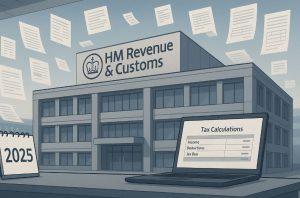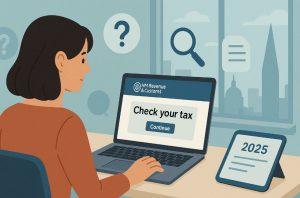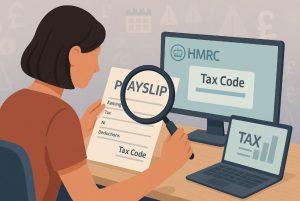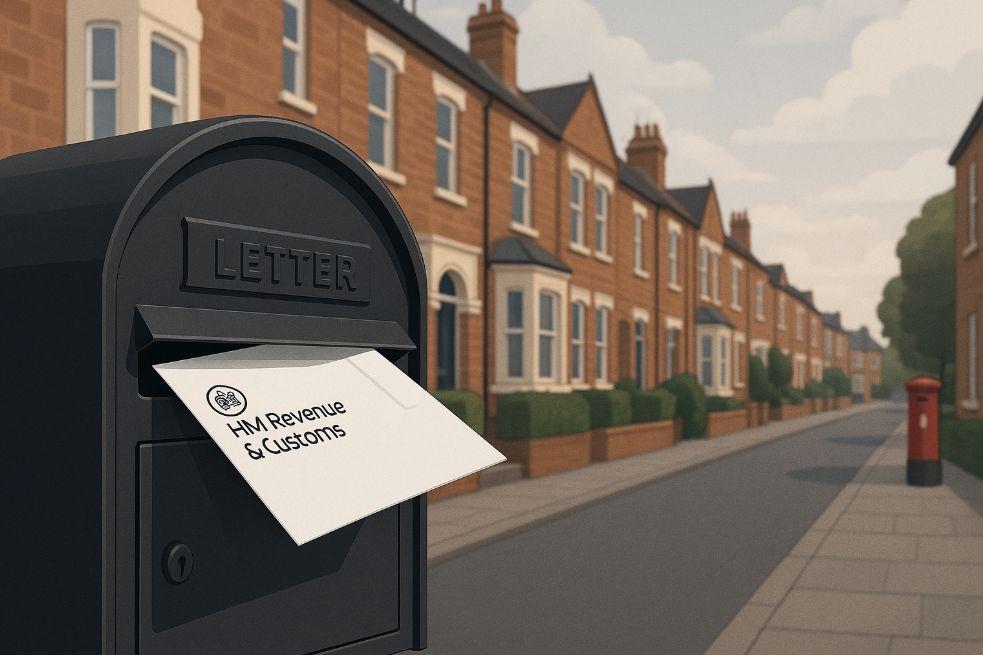Each year, HM Revenue & Customs (HMRC) undertakes a comprehensive review of individual tax accounts to ensure fairness in the UK tax system. In 2025, this process has led to the dispatch of tax refund letters to millions of households across the country.
These letters aim to correct overpayments and return money rightfully owed to taxpayers. While many welcome this unexpected financial relief, others are left wondering if these communications are legitimate, timely, or even accurate. Understanding the reasoning behind HMRC’s move and knowing how to respond appropriately is essential.
What Prompted HMRC to Send Tax Refund Letters in 2025?

Tax Overpayments Triggering Refunds
In 2025, HM Revenue & Customs (HMRC) began sending out thousands of tax refund letters across the UK, with millions more expected throughout the year.
The primary reason behind this mass mailing is to correct HM Revenue & Customs (HMRC). Often, these overpayments occur when taxpayers change jobs, take on multiple jobs, receive work benefits, or when employers submit incorrect PAYE (Pay As You Earn) information.
The P800 Tax Calculation
Many of these letters come in the form of a P800 notice a document issued by HMRC when a taxpayer has paid too much or too little tax. If the P800 indicates an overpayment, the taxpayer is typically entitled to a refund, and HMRC either sends a cheque or offers an online claim option.
Who Is Eligible to Receive a Tax Refund from HMRC?
PAYE Employees and Pensioners
Eligibility for these tax refunds largely includes employees who pay through the PAYE system. Individuals who have changed employment within the tax year, worked multiple jobs, or received benefits such as company cars or private healthcare might be due a refund.
Pensioners who receive income from more than one source (like a private pension and state pension) are also often eligible due to incorrect tax code allocations.
Self-Assessment Taxpayers
Though this particular campaign focuses on PAYE taxpayers, some self-employed individuals may also receive refunds if they overestimated their tax liabilities or claimed legitimate deductions.
How Can You Tell If Your HMRC Tax Refund Letter Is Genuine?
Recognising Legitimate Correspondence
Genuine HMRC letters will:
- Be addressed to the taxpayer by full name
- Contain a reference to the tax year in question
- Include your tax code or National Insurance number
- Offer secure online access through the gov.uk portal
Warning Signs of Scams
With increasing scam activity, it’s crucial to be alert. HMRC will never request personal banking details via email, text, or phone. If a letter or email claims you’re due a refund and pressures immediate action, it could be fraudulent. Always cross-reference communications via your HMRC online personal tax account.
How Much Money Are UK Households Likely to Receive in Refunds?

Estimating Refund Amounts
Refund amounts vary significantly depending on a person’s income, tax code errors, and employment changes. Based on historical data and current calculations, here’s a general breakdown:
Estimated HMRC Refunds by Income Bracket (2024–2025)
| Annual Income Range (£) | Likely Overpayment Scenario | Average Refund Amount (£) |
| £10,000 – £20,000 | Part-time work, tax code error | £150 – £300 |
| £20,001 – £35,000 | Job change mid-year | £250 – £600 |
| £35,001 – £50,000 | Benefits in kind not declared | £400 – £800 |
| £50,001+ | Multiple income sources | £700 – £1,200+ |
Other Contributing Factors
- Tax code misallocations
- Claiming work-from-home tax relief
- Underutilised personal allowance or reliefs
When Will the Tax Refunds Be Sent Out in 2025?
Official Timeline from HMRC
HMRC began sending letters in May 2025, with many more expected throughout July to October 2025. Those affected are being notified in batches to allow for accurate verification of PAYE records.
Communication Methods
While some taxpayers will receive a letter by post, others may be notified through their HMRC online account. It’s advisable to log in regularly to check for updates, especially if you’ve moved recently or opted for paperless communication.
What Should You Do If You Receive a Tax Refund Letter from HMRC?
Immediate Steps to Take
- Verify the letter’s authenticity via your HMRC account.
- Check the details on the letter for accuracy particularly income, tax paid, and your National Insurance number.
- Follow the instructions provided usually directing you to claim the refund online or wait for an automatic cheque.
Handling a Cheque Refund
If you’re issued a cheque, HMRC advises banking it within 6 months of the issue date. After this period, the cheque may expire, requiring you to request a new one.
Can You Claim a Refund If You Haven’t Received a Letter Yet?

Using HMRC’s Tax Checker Tools
Even if you haven’t received a letter, you might still be owed a refund. HMRC encourages taxpayers to log into their Personal Tax Account and use the “Check Your Income Tax for the Current Year” tool.
Requesting a Manual Review
If the system does not show a refund but you believe one is due, you can request a P800 tax calculation or submit a query through the self-assessment or PAYE enquiry forms.
What Are the Risks of Ignoring or Mishandling These Letters?
Missed Refunds and Delays
One major risk is missing out on the refund entirely. HMRC typically provides a four-year window for claiming overpaid tax. If no action is taken within this period, the refund could be forfeited.
Increased Vulnerability to Fraud
If a taxpayer ignores letters, they might fall prey to fraudsters posing as HMRC later. Immediate verification and action ensure that communication channels remain clear and secure.
How Is HMRC Ensuring Accuracy and Preventing Fraud in 2025?
Verification Systems and Cybersecurity
HMRC has bolstered its systems in 2025 with improved data-matching algorithms and cross-departmental record verification. This means discrepancies between employer-submitted PAYE data and real income are more likely to be identified.
Additionally, HMRC has invested in cybersecurity partnerships to detect and block phishing domains and scam websites impersonating official services.
What Do Experts and Financial Advisers Recommend for Taxpayers?

Expert Guidance on Tax Refunds
Financial experts advise taxpayers to:
- Always cross-check tax codes at the start of each financial year
- Claim all eligible deductions, especially if you work from home or use personal resources for work
- Consult a qualified tax adviser if in doubt about the letter’s accuracy or refund value
Use Refunds Wisely
Many advisers recommend using refund money to pay down debt, build savings, or invest in pension contributions especially amid the UK’s ongoing cost-of-living challenges.
What Role Do Employers Play in Tax Overpayments?
Employer Reporting and PAYE Submissions
Employers are required to submit PAYE (Pay As You Earn) information to HMRC every time they process payroll. This includes earnings, deductions, and any taxable benefits provided. However, inaccuracies can occur due to late submissions, wrong tax codes, or misreporting of employee benefits. These errors can directly impact an employee’s tax liability.
Common Employer-Related Issues
When an employee changes jobs or works multiple part-time roles, employers may not have complete information, resulting in the allocation of emergency or incorrect tax codes.
Similarly, benefits such as company cars or medical insurance might not be accounted for properly, leading to excessive tax deductions. These discrepancies are usually corrected by HMRC at the end of the tax year, often triggering refunds.
Why Is It Important to Check Your Tax Code Regularly?

Understanding Your Tax Code
Your tax code determines how much income tax you pay. For example, the standard code for most people in the 2024–2025 tax year is 1257L, which reflects the standard personal allowance. If your tax code is incorrect perhaps due to outdated employer records or unreported benefits you may end up overpaying or underpaying tax throughout the year.
Monitoring and Updating Your Tax Code
Taxpayers should regularly review their tax code through their HMRC personal tax account. If you notice an unfamiliar letter or number in your code, such as K, BR, or D0, it may indicate multiple income streams or the absence of a personal allowance. In such cases, it’s wise to contact HMRC or a financial adviser to ensure accuracy and avoid future surprises.
Conclusion
The initiative by HMRC to issue tax refund letters to millions of UK households is both a corrective and proactive measure to ensure tax fairness. As taxpayers become more mobile and incomes more complex, these periodic adjustments are vital.
Understanding how and why these letters are sent, what they mean, and how to act on them empowers individuals to take full control of their financial standing in 2025.
FAQs
How do I update my address with HMRC if I’ve moved recently?
You can update your address via your online personal tax account or by contacting HMRC directly. This ensures you receive any refund communications.
What should I do if I’ve lost my P800 tax refund letter?
Log into your personal tax account to check your latest communications, or contact HMRC to request a duplicate.
Is a tax refund from HMRC taxable income?
No, tax refunds are not considered income they’re a return of your own overpaid taxes.
How long does it take to receive the refund after claiming it?
Online claims are usually processed within 5 working days. Paper cheques may take up to 2 weeks.
Can I refuse a refund if I believe it’s incorrect?
Yes, you can contact HMRC to challenge or request a reassessment if you think the refund amount is wrong.
What happens if I owe tax instead of getting a refund?
If your P800 shows underpayment, HMRC will explain how much you owe and provide payment options.
Can someone else claim my refund on my behalf?
Only authorised agents or financial advisers with HMRC-approved representation can claim on your behalf. Be cautious of third-party services promising fast refunds.









Leave feedback about this